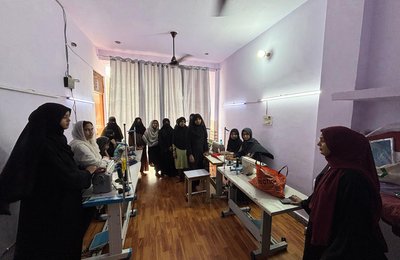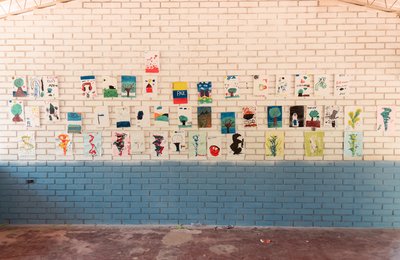 Women have been instrumental in promoting the importance of peace in Somalia. (© DfID / Flickr)
Women have been instrumental in promoting the importance of peace in Somalia. (© DfID / Flickr)Gender development practitioners have pointed out that although conflict may create a space to make a redefinition of social relations possible at the community level, it merely rearranges, readapts or reinforces patriarchal ideologies, rather than fundamentally changing them. In a sense, the position of men and women in building peace appears different, for they face distinct experiences and relationships based upon gender. When the war was at its peak and fierce warfare raged between rival clans throughout the 1990’s, many women were able to play ‘the role of peace envoy or messenger between her husband’s clan and her father’s clan.’ This different engagement provided women with a chance of dealing with armed conflicts often only initiated by men over power, resources or for other reasons.
Some activists have argued that it was a moral obligation for women to seek and foster peace, but women’s commitment to peacebuilding can also be linked to the horrors which they had encountered during the war, and that the "experience of the sufferings of war […] turned women’s minds to this peacemaking function, while at the same time they […] acquired new roles in organised groups."
The terms ‘peacebuilding’ and ‘peace promotion’ are used interchangeably in Somalia, and refer to policies and programmes which restore stability and ‘effective social, political and economic institutions after a war or serious upheaval.’ As such, some women, as mothers and as leaders, demonstrate capacity for being peacebuilders, in order to broaden the ethos of peace in their houses and within the wider community. They have held demonstrations for peace, and chanted slogans that ‘Somali women need peace, not war.’ Possibly motivated by a desire for communal wellbeing, women have carried out peacebuilding initiatives in negotiating agreements between warring clans. Throughout these mediations, Somali women have appeared to be the most able peacemakers and developers.
Promoting peace through poetry
Indeed, verbal communication through poetry, as illustrated above, has an extremely important place in Somali society. Some gender activists have shown that women often recite or sing poetry, which can either urge the men to continue fighting, shame them for losing, or encourage the peaceful resolution of the conflict. Here, a thirteen-year-old Somali schoolgirl, Samira Omar Said, calls for an urgent peaceful arrangement.
Peace! Peace! Peace assurance I call Everyone in society has a great role to play Never to repeat previous mistakes Never to shun responsibilities Because peace is a collective responsibilityThe Somali poetess Mariam Mohamud, known as Ja’eyl, stresses how the buraambur form valuable harmonies amongst warring clans, and describes it as a powerful tool that can be applied to create peace settlements and community cohesion. Mohamud’s two recent poems, ‘Allow nabad noogu deeq’ (Oh God bestow peace upon us) and ‘aaway barafasooradii Soomaaliyeed?’ (Where have the Somali intellectuals disappeared?) are not only intended to create a common Somali solidarity, but are also powerful calls of prayer for peace.
Equally, another buraambur, sent by Faduma Mohamud Osman from northeast Somalia, shows the commitment of women to foster peace.
We, the womenfolk in Bari [eastern] region, are not vindictive And are ready for peace making; As always, we are in readiness fostering the unity of the Somali society. To achieve justice for all is a principle vehemently Supported by womenfolk In the face of fallen and crying statehood and, Devastation of the country, Somali womenfolk do not sleep at ease.In some areas in Somalia, when women are past childbearing age, they are ‘accepted as elders and do help settle disputes, though they cannot participate in all the activities of elders’. Yet, while the buraanbur make women appear as promoters of peace, the experiences during the height of the clan-wars also showed other poems, which could not be ignored. In a critical buraambur sent by Adar Abdi Fiidow from Beledweyne, a city in central Somalia, it seems to accuse women of being the only ‘perpetrators’ of war. Fiidow, nonetheless, describes her feeling thus:
Disarm now, discard and bury divisive for the sake of peace / Seek to resolve existing differences peacefully and intelligently with the pen and not the sword / Somalis, bury the hatchet, let there be no more slaughtering, and ordain peace as a priority issue for deliberation / Anti-peace elements and belligerent men who are yet unprepared for it / we are ready to challenge them and convince them to join the peace process / Somali women, whichever your country of abode, be reminded of action on this obligation / Somali womenfolk, strive to keep your war-mongering men in the bounds of morality / Wives should preach peace and reconciliation to their partners at home / Where are the writers and university professors, and why don’t they produce peace literature? Why don’t you propagate and consolidate peace regardless of your clan origin?








